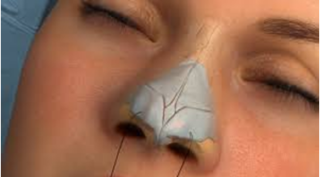


There are multiple kinds of sinus issues that can happen, involving your nose, eyes, cheekbones, and even teeth depending on the issue. This is due to the placement of the sinuses – behind the eyes, around the nose, and in the lower forehead.
Because the sinus and nasal cavities are hidden to the naked eye, an ENT doctor is needed to diagnose any infections, disorders, or malformations. One of the common nasal issues our ENTs deal with are nasal polyps, which typically aren’t noticeable until they’re far enough along to cause symptoms.
Nasal polyps are noncancerous growths that can form on the inner lining of your nasal passages or sinuses. They are soft, painless, and hang down like grapes.
They are caused by chronic inflammation, and you are more likely to develop them if you have asthma, recurring infection, allergies, aspirin sensitivity, vitamin D deficiency, cystic fibrosis, or certain immune disorders. In fact, most of our patients who have nasal polyps are also diagnosed with chronic sinusitis.
Nasal polyps typically develop when your sinuses are swollen and inflammed for several weeks at a time. Even though your sinuses may hurt due to the inflammation, your nasal polyps shouldn’t be noticeable due to their small size. Nasal polyps may be noticeable if they grow big enough to block your airway and cause nasal breathing issues like snoring and shortness of breath.
In this case, you’d need to undergo sinus surgery.
As previously stated, nasal polyps aren’t typically noticeable unless a sinus specialist is examining your nostrils.
Common signs and symptoms of chronic sinusitis with nasal polyps include:
Nasal polyps are usually harmless, but in some cases you need medical attention.
Nasal polyps can cause health problems if they are big enough to block the airways. This can cause issues with breathing and fluid drainage. Because nasal polyps are caused by long-term swelling and irritation, there can be additional problems associated with these symptoms.
Potential complications with nasal polyps include:
There’s no exact cure for nasal polyps, but treatments can help.
A sinus doctor may be able to administer the following treatments:
It’s better to prevent nasal polyps than to treat them. If you have asthma, severe allergies, or inflammation or infection in your nose in sinuses, you should have an ENT or sinus specialist on hand. This way, you can start taking medication to get ahead of the formation of nasal polyps.
Keeping the air you breathe at night moist can help keep your nose healthy. With the dry California air, you should buy a humidifier for your home.
Keeping your hands and nose clean can prevent potential infections, so make sure to practice good hygiene!
For the best sinus treatment possible, contact our Los Angeles ENT office!